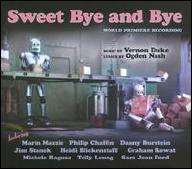Duke settled in Paris in 1924, receiving a commission from Serge Diaghilev to compose the ballet +Zephyr and Flora, which premiered the following year; although his First Symphony was performed in 1928 by Serge Koussevitzky and his orchestra, he spent much of the latter half of the decade in London, writing for the musical stage. Duke returned to New York in 1929 and began writing for Broadway, teaming with lyricist Yip Harburg to score his first major pop hit with April in Paris, from the 1932 musical +Walk a Little Faster. He authored his own lyrics for Autumn in New York, from 1934's +Thumbs Up, and that same year also penned I Like the Likes of You and What Is There to Say for the Ziegfeld Follies, to whom he later contributed I Can't Get Started, An Island in the West Indies, and That Moment of Moments as well. In the meantime, as Dukelsky he continued working on ballets (1934's +Jardin Public, from a scenario by André Gide), concertos (Dédicaces [Posviashcheniia]), and oratories (The End of St. Petersburg, perhaps his most challenging composition).
Duke's greatest commercial success followed with the 1940 Broadway premiere of +Cabin in the Sky, an all-black musical choreographed by George Balanchine; Ethel Waters introduced the production's most famous number, Taking a Chance on Love. Two years later, Duke entered the U.S. Navy, but after the war his career floundered, and in 1946 he returned to Paris before settling in California two years later. In 1952, he collaborated on the musical +Two's Company with Ogden Nash, and in 1957 married singer Kay McCracken. Five years later, Duke published his first book of poetry, -Epistles; his memoir -Passport to Paris appeared several years earlier, and he additionally published dozens of articles in both English and Russian. 1966's Anima Eroica (Ode to St. Brigitte) was Duke's last major completed work; he died during a lung cancer operation on January 16, 1969. ~ Jason Ankeny, Rovi












